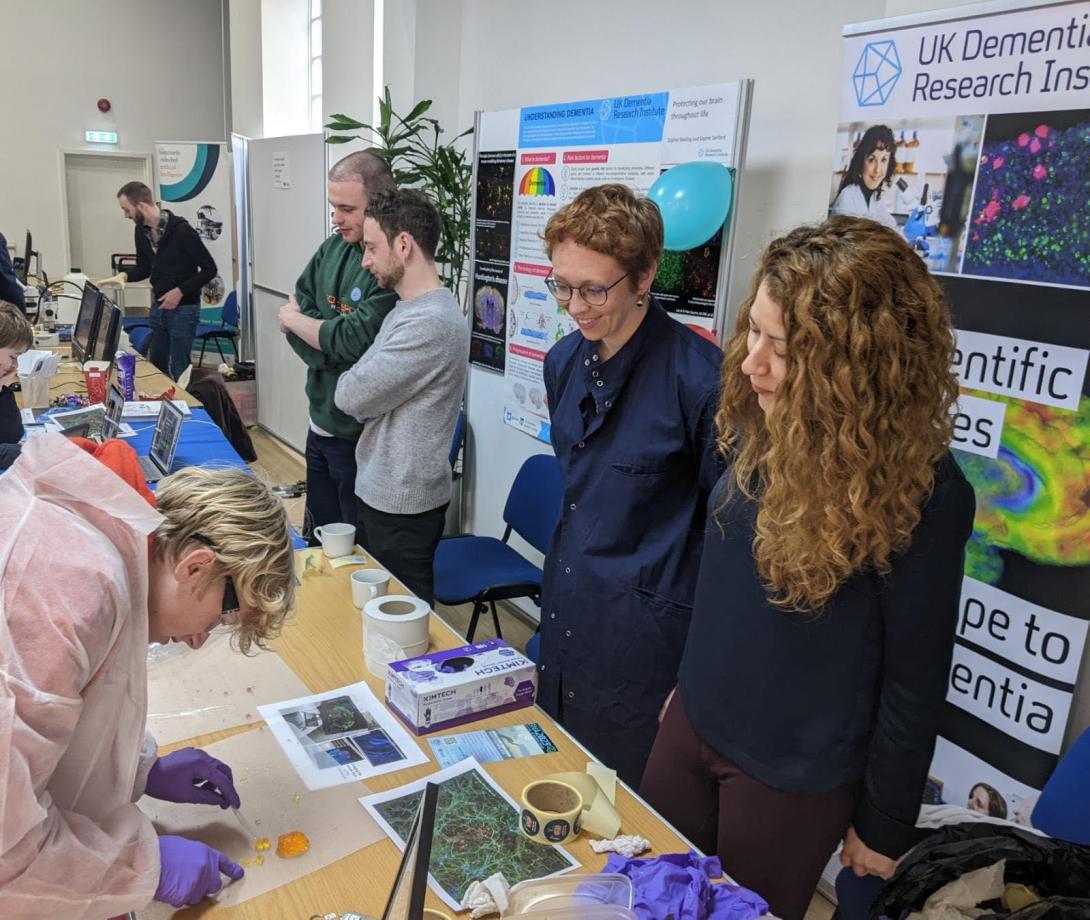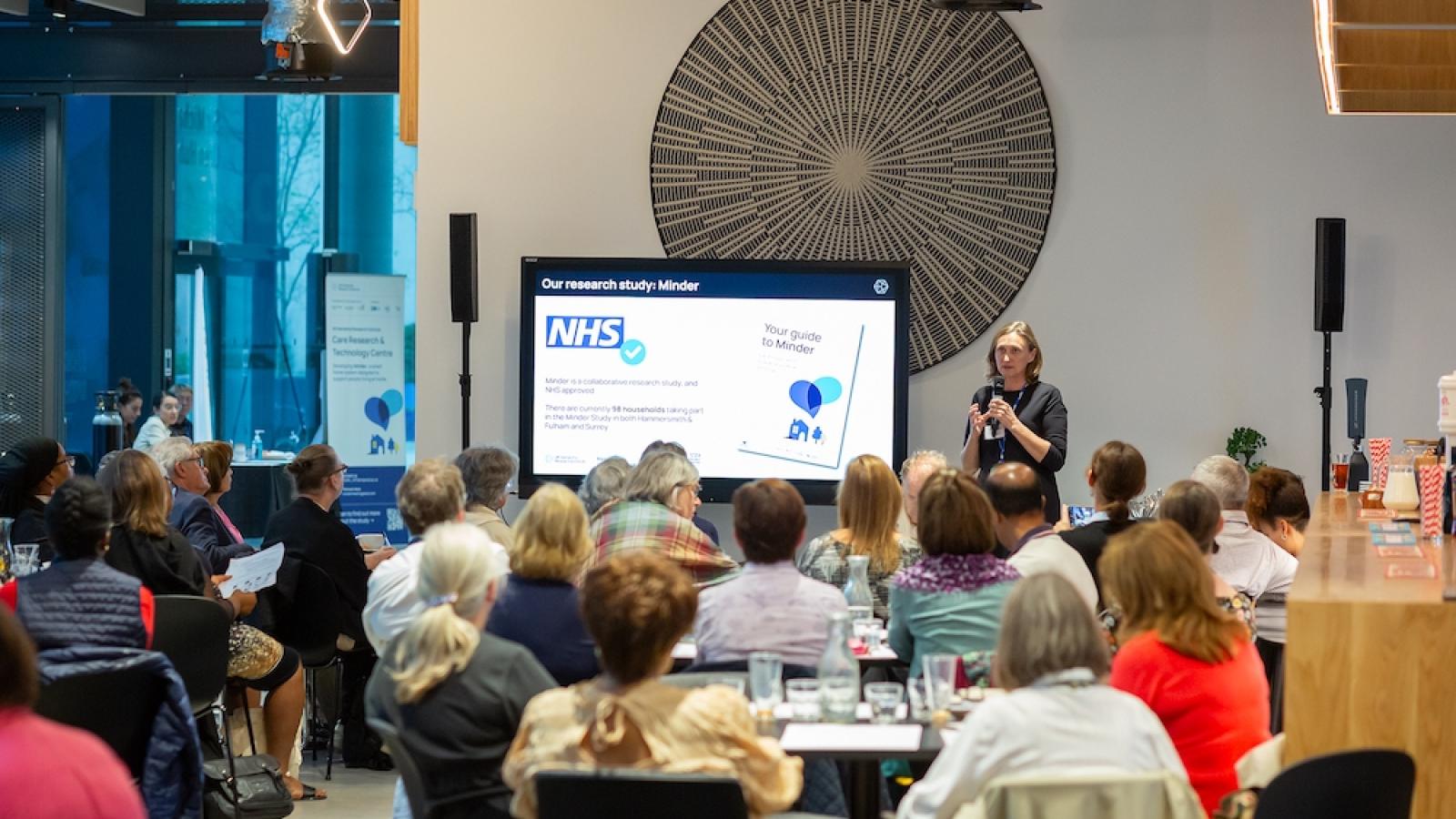When members of the public are actively engaged in research - whether through outreach events, participating in studies, or interacting with scientists - they get a first-hand look at the real-world human impact of scientific discoveries, and the life changing potential of research.
Demonstrating why research matters to people’s lives is incredibly powerful, motivating individuals to become enthusiastic advocates for research – helping raise awareness and urging policymakers to provide more funding for science. Involving people in research takes this a step further, ensuring that research output from scientists is not only high-quality, but also relevant to those in society it is set to impact.
I think that it is incredibly important that we, as researchers, share our work with the people we are trying to benefit.Cliona FarrellUK DRI at UCL
Researchers across the UK DRI are working to engage the public in a multitude of ways. Each year, an Engagement Prize is awarded at the UK DRI’s annual conference, Connectome, highlighting initiatives and activities in public engagement and patient involvement across the Institute. This year, the calibre of the four nominations was extremely high:
Empowering more women to engage in neuroscience
Lizzie English (UK DRI at Cambridge) founded Women In Neuroscience UK (WiNUK), an organisation that aims to improve gender equity in neuroscience. WiNUK is opening doors for broader involvement in research by creating an empowering community for female neuroscientists. The community now has a blog, written by a diverse group of neuroscientists, as well as holding regular events. Through innovative approaches across platforms such as TikTok, WiNUK is expanding perception of the kinds of people who participate in science. The use of these platforms enables WiNUK to reach an audience who may not otherwise have been exposed to research. WiNUK’s UK DRI Twitter takeover on International Women’s Day increased average retweets 7-fold and replies 24-fold; uniting charities, universities and researchers in raising awareness of inspirational women and the inequities in dementia research. WiNUK was nominated for a National Diversity Award in 2023.
Improving inclusion of people with lived experience in research design
Over the past year, Sarah Daniels, Health and Social Care Lead and Sophie Horrocks, Designer and Public Involvement Lead at the UK DRI Centre for Care Research & Technology, have driven a range of engagement initiatives for the co-design of research activities within the Centre. Together with Centre Manager Danielle Wilson and Matt Harrison from Imperial’s Helix Centre, the team have generated a detailed roadmap of activities which will improve the inclusion of public, patients and carers, as well as professional health and social care providers that have an interest in designing research projects aligned to participant's needs and capabilities. By intricately incorporating both public perspectives and those of service providers into project development, they aim to ensure that the Centre’s research better serves the priorities of people affected by dementia. This approach has led to the launch of a new national network, Friends of CR&T, which aims to create a community of researchers, clinicians, and people with lived experience, where all can learn from one another.
Creativity to engage wide audiences
This year, Sophie Keeling (UK DRI at Cambridge) organised for a group of UK DRI researchers to attend the BNA Festival and Royal Society Summer Exhibition outreach events in Brighton and London, providing opportunities to reach wide audiences. She designed bespoke activities, including the fantastically creative dissection of ‘jelly brains’, catered to diverse age groups, and resulting in enthusiastic engagement. Sophie was able to meet people at the right level, explaining complex scientific topics in relatable and engaging ways.

Sophie designed bespoke activities including the dissection of jelly brains (pictured)
A World Down Syndrome Day celebration
On World Down Syndrome Day (21 March), Emily Blackburn, Cliona Farrell, and Paige Mumford (UK DRI at UCL) co-organised and ran an impactful engagement event for people with Down syndrome, their families and carers. The day was a huge celebration, with the goal of educating people about Down syndrome and sharing the ongoing research, including highlighting the link between Alzheimer's disease and Down syndrome. At the event, there were talks from scientists and medical professionals, as well individuals who have Down syndrome. Many engaging activities targeted toward all age groups were hosted, including making play-doh neurons, using microscopes, making brain hats, pairing chromosomes and a photo-booth.
Emily, Paige and Cliona’s work was crucial in making this event a great success, and the three were jointly awarded the UK DRI Engagement Prize for 2023.
On receiving the award, Cliona said:
“I think that it is incredibly important that we, as researchers, share our work with the people we are trying to benefit. People with Down syndrome have a very high risk to develop Alzheimer's disease, as well as other conditions.
At this annual event, researchers across many London institutions shared their research or medical expertise in Down syndrome in an accessible way, to encourage questions and discussions. We also had record numbers of attendees this year, highlighting the need for these types of science engagement events. The experience was incredible rewarding and we look forward to hosting the event again in March 2024!”
As these examples demonstrate, robust engagement is fundamental to undertaking research that transforms lives. When done well, it ceases to be just an add-on and becomes integral to the research itself. The researchers’ commitment to engagement initiatives both empowers the community, and propels progress. If engagement is approached as fundamental rather than supplemental, new horizons open for discoveries that truly make a difference to people affected by dementia.
Article published: 6 December 2023
Image credits: Imperial College London, Sophie Keeling
